沪教版七年级下册Unit 6 Electricity单词和语法
- 格式:doc
- 大小:151.00 KB
- 文档页数:16
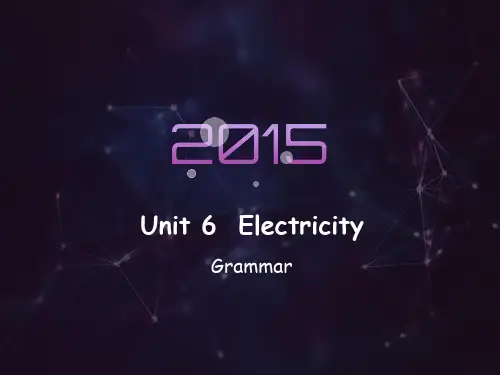
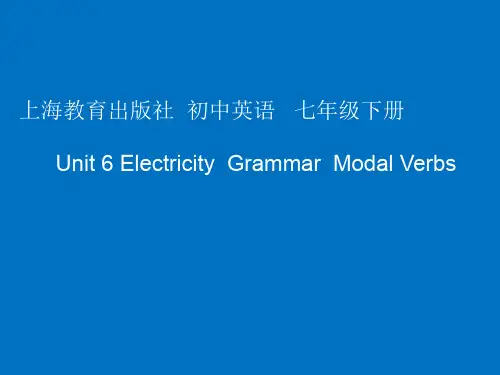
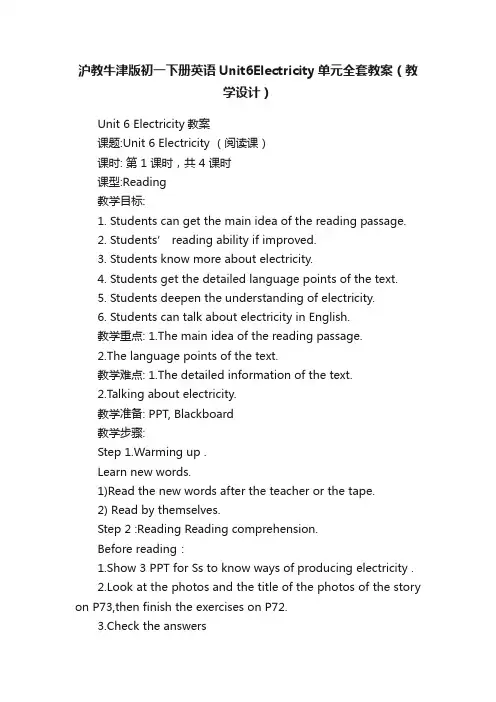
沪教牛津版初一下册英语Unit6Electricity单元全套教案(教学设计)Unit 6 Electricity教案课题:Unit 6 Electricity (阅读课)课时: 第 1 课时,共 4 课时课型:Reading教学目标:1. Students can get the main idea of the reading passage.2. Students’ reading ability if improved.3. Students know more about electricity.4. Students get the detailed language points of the text.5. Students deepen the understanding of electricity.6. Students can talk about electricity in English.教学重点: 1.The main idea of the reading passage.2.The language points of the text.教学难点: 1.The detailed information of the text.2.Talking about electricity.教学准备: PPT, Blackboard教学步骤:Step 1.Warming up .Learn new words.1)Read the new words after the teacher or the tape.2) Read by themselves.Step 2 :Reading Reading comprehension.Before reading:1.Show 3 PPT for Ss to know ways of producing electricity .2.Look at the photos and the title of the photos of the story on P73,then finish the exercises on P72.3.Check the answersWhile reading:1.Careful reading Read the article carefully and then finish Part C1.2.Check their answers.3.Read the article again to finish C2. Check their answers.post reading:Comprehension D1 and D2Read the text to finish the comprehension exercise on p 75.Step 3: Reading practice .1.Read after the tape.2. Read in roles.3.Imitation and role play.Step4.Review the text.Task learning :Make a flow chart.Step 5: Language points. Self- study.①Learn the sheet given by the teacher.②Finis h the corresponding exercise.③Check with your group members.Step 6: Retell the text:Give a report of electricity.Step 7: DiscussionDebate: Is the electricity good or bad?.Step8: Sum upStep9 HomeworkStep10.The blackboard designUnit 6 ElectricityReply foolish connect moment batterya packet of 一包,一捆be connected to 连接到in a way 在某种程度上课题:Unit 6 Electricity(听说课)课时: 第 2 课时,共 4 课时课型: Listening & Speaking教学目标:1. Master expressions on electrical equipment.2. Students learn some simple Modal verbs.3. Students listening ability is improved.教学重点:Get the main points of the listening.教学难点:The new words and modal verbs in the listening.教学准备: PPT, Blackboard, music教学步骤:Step1.Lead in .向学生介绍听力技巧及步骤。
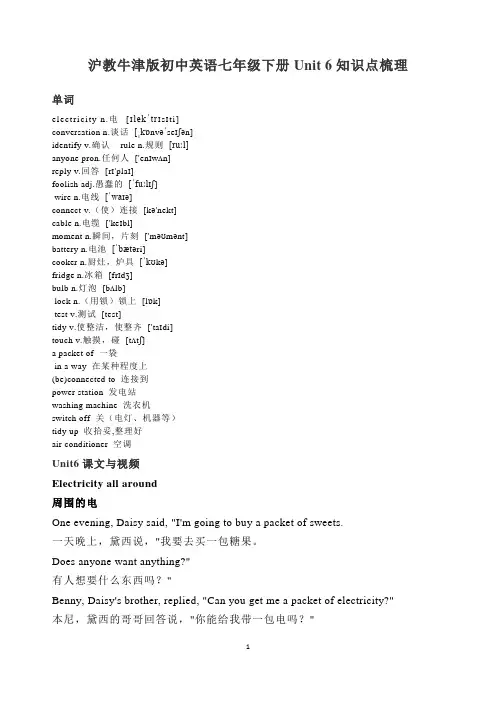
沪教牛津版初中英语七年级下册Unit 6知识点梳理单词electricity n.电[ɪlekˈtrɪsɪti]conversation n.谈话[ˌkɒnvəˈseɪʃən]identify v.确认 rule n.规则[ruːl]anyone pron.任何人['enɪwʌn]reply v.回答[rɪ'plaɪ]foolish adj.愚蠢的[ˈfuːlɪʃ]wire n.电线[ˈwaɪə]connect v.(使)连接[kə'nekt]cable n.电缆['keɪbl]moment n.瞬间,片刻['məʊmənt]battery n.电池[ˈbætəri]cooker n.厨灶,炉具[ˈkʊkə]fridge n.冰箱[frɪdʒ]bulb n.灯泡[bʌlb]lock n.(用锁)锁上[lɒk]test v.测试[test]tidy v.使整洁,使整齐['taɪdi]touch v.触摸,碰[tʌtʃ]a packet of 一袋in a way 在某种程度上(be)connected to 连接到power station 发电站washing machine 洗衣机switch off 关(电灯、机器等)tidy up 收拾妥,整理好air conditioner 空调Unit6课文与视频Electricity all around周围的电One evening, Daisy said, "I'm going to buy a packet of sweets.一天晚上,黛西说,"我要去买一包糖果。
Does anyone want anything?"有人想要什么东西吗?"Benny, Daisy's brother, replied, "Can you get me a packet of electricity?"本尼,黛西的哥哥回答说,"你能给我带一包电吗?""Yes, I can," said Daisy. Then she went out."是的,我能,"黛西说。
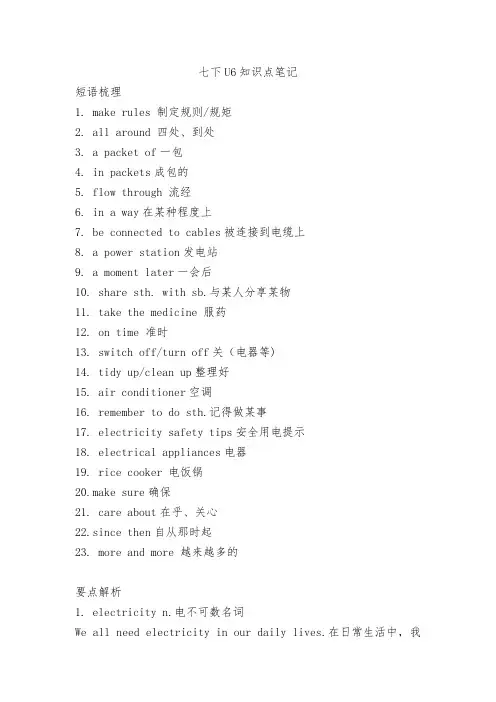
七下U6知识点笔记短语梳理1. make rules 制定规则/规矩2. all around 四处、到处3. a packet of一包4. in packets成包的5. flow through 流经6. in a way在某种程度上7. be connected to cables被连接到电缆上8. a power station发电站9. a moment later一会后10. share sth. with sb.与某人分享某物11. take the medicine 服药12. on time 准时13. switch off/turn off关(电器等)14. tidy up/clean up整理好15. air conditioner空调16. remember to do sth.记得做某事17. electricity safety tips安全用电提示18. electrical appliances电器19. rice cooker 电饭锅20.make sure确保21. care about在乎、关心22.since then自从那时起23. more and more 越来越多的要点解析1. electricity n.电不可数名词We all need electricity in our daily lives.在日常生活中,我们都需要电。
相关词:1) electric adj.强调(事物本身)用电的或带电的an electric guitar电子吉他2) electrical adj.与电相关的an electrical engineer电子工程师3) electronic adj.电子的(设备),(倾向于物理角度,包括指通过半导体等传输电子)an electronic equipment电子设备(比如电脑、电视等)2. rulen.规则、条例the rules of football足球规则follow a rule遵守规则break a rule 违反规则v. 统治The queen ruled England for many years.女王统治英国很多年。
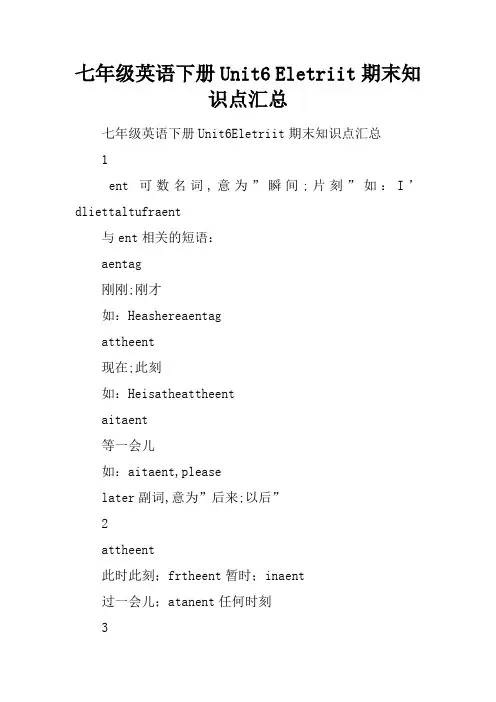
七年级英语下册Unit6 Eletriit期末知识点汇总七年级英语下册Unit6Eletriit期末知识点汇总1ent可数名词,意为”瞬间;片刻”如:I’dliettaltufraent与ent相关的短语:aentag刚刚;刚才如:Heashereaentagattheent现在;此刻如:Heisatheattheentaitaent等一会儿如:aitaent,pleaselater副词,意为”后来;以后”2attheent此时此刻;frtheent暂时;inaent过一会儿;atanent任何时刻3apaetf一袋不可数名词没有复数形式,在表示数量时,常用“a+单位量词+f+不可数名词”结构。
如:apieefeat;apieefpaper;aglassfappleuie;abagfil数词+单位量词+f+不可数名词\可数名词复数如:tglassesfater;threeupsftea;tpaetsfseets;threebagsfpenils4inaa在某种程度上nthea在路上;inthea挡道;inthisa这边走;bthea顺便问下nnet连接…常用结构:bennetedtsth连接到……nnetstht/ith…把…和…连接起来如:TurnnurputerandnnetitttheInternet TherailalinennetsuhantShanghai6perstatin发电站7ashingahine洗衣机8sithff=turnff关掉9tidup收拾整理=putaaairnditin空调1eint进入……之内2prvidesbithsth供应给某人某物如:Thesunprvidesusithlightandheat“为某人提供某物”还可以用prvidesthfrsb3“asan+复数名词+as”意为”和……一样多的…”如:Ihaveasanbsasu我和你有一样多的书“asuh+不可数名词+as”意为”和…一样多的…”如:brtherdrinsasuhilasIeverda4sharesthithsb与某人合用/分享某物“eep+sb/sth+形容词”意为“让某人/某物保持某种状态”。
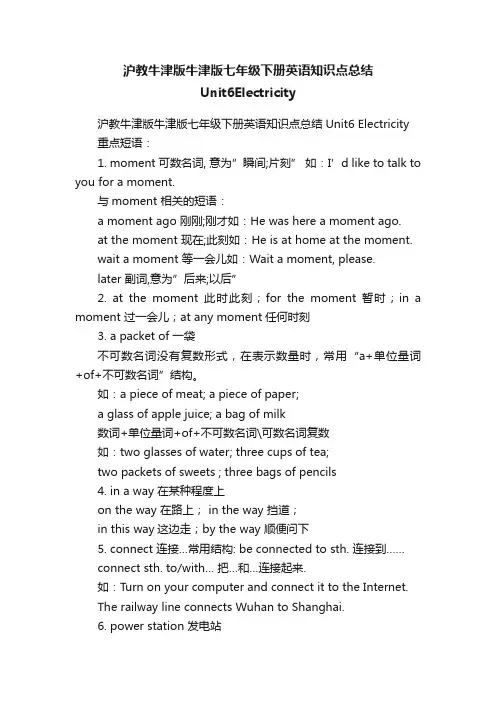
沪教牛津版牛津版七年级下册英语知识点总结Unit6Electricity沪教牛津版牛津版七年级下册英语知识点总结Unit6 Electricity 重点短语:1. moment 可数名词, 意为”瞬间;片刻” 如:I’d like to talk to you for a moment.与moment 相关的短语:a moment ago 刚刚;刚才如:He was here a moment ago.at the moment 现在;此刻如:He is at home at the moment.wait a moment 等一会儿如:Wait a moment, please.later 副词,意为”后来;以后”2. at the moment 此时此刻;for the moment 暂时;in a moment 过一会儿;at any moment任何时刻3. a packet of 一袋不可数名词没有复数形式,在表示数量时,常用“a+单位量词+of+不可数名词”结构。
如:a piece of meat; a piece of paper;a glass of apple juice; a bag of milk数词+单位量词+of+不可数名词\可数名词复数如:two glasses of water; three cups of tea;two packets of sweets ; three bags of pencils4. in a way 在某种程度上on the way 在路上; in the way 挡道;in this way这边走;by the way 顺便问下5. connect 连接…常用结构: be connected to sth. 连接到……connect sth. to/with… 把…和…连接起来.如:Turn on your computer and connect it to the Internet.The railway line connects Wuhan to Shanghai.6. power station 发电站7. washing machine 洗衣机8. switch off=turn off 关掉9. tidy up 收拾整理=put away10. air condition 空调11. come into 进入……之内12. provide sb. with sth. 供应给某人某物如:The sun provides us with light and heat.“为某人提供某物”还可以用provide sth. for sb.13. “as many + 复数名词+as ” 意为”和……一样多的…”如:I have as many books as you. 我和你有一样多的书.“as much +不可数名词+as” 意为”和…一样多的…”如:My brother drinks as much milk as I every day.14. share sth. with sb. 与某人合用/分享某物15. (1 )“keep + sb. / sth. + 形容词”意为“让某人/某物保持某种状态”。
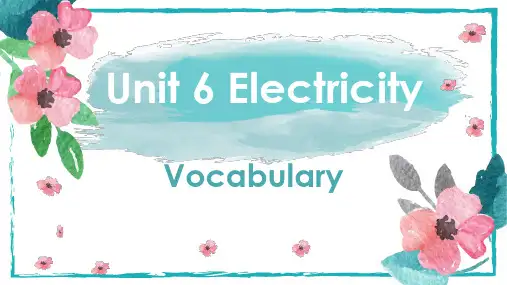
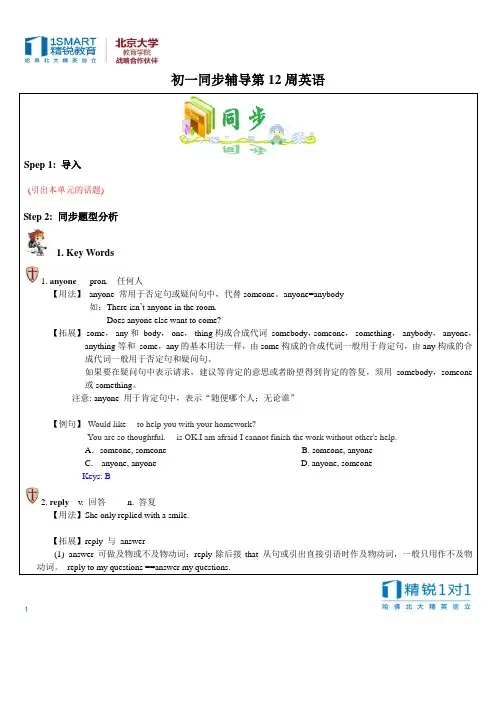
初一同步辅导第12周英语Spep 1: 导入(引出本单元的话题)Step 2: 同步题型分析1. Key Words1. anyone pron. 任何人【用法】anyone 常用于否定句或疑问句中,代替someone。
anyone=anybody如:There isn’t anyone in the room.Does anyone else want to come?【拓展】some,any和body,one,thing构成合成代词somebody,someone,something,anybody,anyone,anything等和some,any的基本用法一样,由some构成的合成代词一般用于肯定句,由any构成的合成代词一般用于否定句和疑问句。
如果要在疑问句中表示请求,建议等肯定的意思或者盼望得到肯定的答复,须用somebody,someone或something。
注意: anyone 用于肯定句中,表示“随便哪个人;无论谁”【例句】-Would like__ to help you with your homework?-You are so thoughtful. __is OK.I am afraid I cannot finish the work without other's help.A.someone, someone B. someone, anyoneC. anyone, anyoneD. anyone, someoneKeys: B2. reply v. 回答n. 答复【用法】She only replied with a smile.【拓展】reply 与answer(1) answer 可做及物或不及物动词;reply除后接that 从句或引出直接引语时作及物动词,一般只用作不及物动词。
reply to my questions ==answer my questions.1如:He replied that he had changed his mind.He didn’t reply to/answer my question.(2) answer 除表示“回答”外,还可表示接听(电话)或对门铃等声响作出反应等。
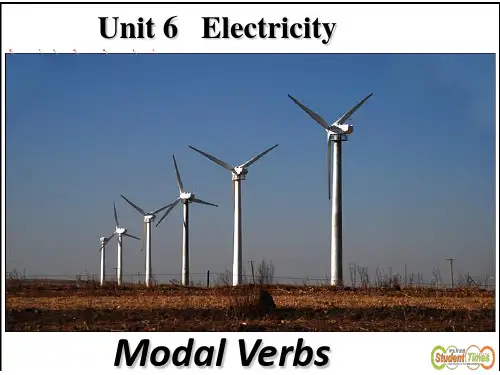
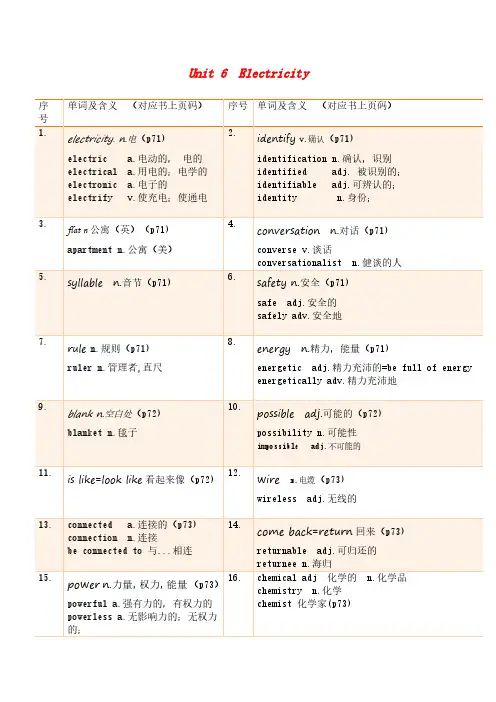
Unit6Electricity1.In this unit,you will learn about electricity。
(p71)(1)判断一个词前是用a还是an,是根据其读音,而不是根据其字母。
(2)在26个字母中前面用an的字母有:a,e,f,h,i,l,m,n.o,r,s,x他用a。
(3)要注意区别以“u”开头的单词:当“u”发/ʌ/音时,单词前面用an,如an umbrella,an unhappy boy.当“u”发/juː/音时,单词前用a,如a university,a useful tool,a unit,a usual day.,a Europe country.(4)要注意区别以第一个字母不发音的单词要用an,如:an honour,an hour,anhonest.(5)含有a的常见固定词组A few/a little/a bit一点have a cold感冒have a good time玩得开心keep a diary记日记do sb a favor帮助某人in a hurry匆忙2.Read a story about electricity.(p71)四个“看”:look、see、watch、read的区别与用法。
look:“看”,强调看的动作,过程see:“看见、看到”强调看的结果,也可以表达“明白,知道”常用于口语watch:“观看,注视”,强专注地看,有欣赏的意味,如:看电视,看比赛等。
read:指“看”时指“阅读”,常用于看书、看报纸、看杂志等。
例如:(1)I like reading at home.我喜欢在家看书。
(2)My father used to read the newspaper after supper.我的爸爸习惯在晚饭之后看报纸。
look短语:look after照顾;照料look around环顾四周look down俯视look for寻找look into调查;审查look like看起来像look out小心;当心look over仔细检查look through快速查看;浏览look up查阅look out of向/往外看look back at回首(往事);回忆;回顾look down upon/on瞧不起look forward to盼望;期待look up to尊敬;钦佩;仰慕3.Listen to a conversation about electricity in a flat.(p71)三个“听”:hear,listen,sound的区别与用法。
初中英语教学辅导讲义Step 1 Homework Checki ng作业讲评;词汇短语听写:单词得分_____________ 短语得分________________ 上节课知识点回顾。
Step 2 Warmin g-up经典广告(二)^1、IBM公司:没有不做的小生意,没有解决不了的大问题No bus in ess too small, no problem too big.2、三星电子:感受新境界。
Few the new space.3、麦斯威尔咖啡:滴滴香浓,意犹未尽。
Good to the last drop.4、百事流行鞋:渴望无限。
Ask for more.Step 3 Pho netic Symbols语音基础小练习:选出下列每组单词中音节数目与其他三项不同的一项( )1. A. bottom B. reply C. con ti nue D. return ( )2. A. test B. fat C. fridge D. journey ( )3. A. major B. enjoy C. tidy D. oxygen ( )4. A. remember B. perfect C. potato D. furniture ( )5. A. favourite B. harmful C. produce D. airportStep 4 Lan guage Lear ningUn it Six Electricity1. electricity n.电e.g. Can you get me a packet of electricity ?你能给我一包电吗?【解析】(1)electricity意思是电”常常用作不可数名词(2)这个单词共有五个音节:e-lec-tri-ci-tye.g. We use electricity to run machi nes.我们使用电力来运行机器。
Unit6 Electricity学习目标:1.话题:A以“电”为话题,以节约用电和安全用电为主线。
B用情态动词表示能力允许或者向人提出警告、劝解2.语法:情态动词Useful phrases:1.make rules for sth 13.in packets2.flow through 14.be like/look like3.in a way 15.connect...to/be connected to4.a moment later 16.look foolish5.change...into... 17.stay up late6.do more exercise/take exercise 18.share cups with others7.share sth with sb 19.make sure8.care about 20.take the medicine9.be ready to do sth 21.be able to10.at least 22.see the doctor11.on time 23.divide...into...12.be careful with 24.all kinds ofUseful sentences:1.Electricity comes into our flat through thin wires. electricity n.电electrician n.电工There is a problem with the electricity in Tom’s flat. An electrician has come to deal with it.Electric a.带电的electric storm electric shockElectrical a.与电有关的electrical apparatus电器2.They are connected to a power station.3.Who looks foolish now?=Who looks silly now?4.It is like water in a way.1)in a way在某种程度上,稍稍。
七下Unit 6 Electricity1.safety rules 安全须知2.make some home/family rules 制定家庭制度3.There are different ways of producing electricity. 生产电能有多种方法。
4.a packet of 一袋5.get / buy sb sth = get / buy sth for sb. 给某人买某物6.buy electricity in packets like sweets (不建议作为词组)7.look foolish 看起来很傻8.give us power = give power to us 给我们能量9.flow through 流动10.I t’s like water, in a way. 某种程度上,电就像水一样流动。
11.b e connected to 连接12.a power station 发电站13.a moment / minute later 过一会儿14.H ere you are. 给你15.r eply to a question = answer a question 回答问题16.w ait for a moment = wait for a minute 等一下17.p rovide sb. with sth. 给某人提供某物18.l ive in a world without electricity 生活在一个没有电的世界19.b e able to / be unable to 能够20.p lay the guitar / play chess 弹吉他/下象棋21.H ow are you feeling? --- Not very well. 你感觉如何?--不是很好22.M ay I carry your bag for you? 需要我帮你扛袋子吗?23.b e ready to do sth. 乐意做某事/准备好了做某事24.s hare sth with sb. 与某人分享某物25.t ake the medicine 服药26.o n time 准时27.l ock the door 锁门28.s witch off = turn off; 关闭switch on= turn on 打开29.t idy up 整理好30.a ir conditioner 空调31.E lectricity makes our lives easier. 电使我们的生活更便利。
Unit 6 Electricity词句精讲精练撰稿人:王晓丽审稿人: 郭素清词汇精讲1. anyoneanyone是代词,意为“任何人”,anyone = anybody,作主语时,谓语动词用第三人称单数形式。
例如:Anyone can come to the party. 任何人都能来参加这个聚会。
Does anyone have a bike? 有人有自行车吗?【拓展】(1) everyone意为“所有人,每个人”,同义词为everybody,相当于each person。
当everyone在句中作主语的时候,句子的谓语动词应使用单数形式。
例如:Everyone knows it. 大家都知道这件事。
(2) someone意为“某人”,等同于somebody,只可用来指代人。
例如:Someone wants to talk with you. 有人想和你谈话。
2. connectconnect 动词,意为“连接,把……连接起来”。
常用于“connect + 名词/代词+ with / to…”表示“把……连起来”。
例如:I can’t connect the computer to (with) the printer. 我不会把打印机和电脑连在一起。
3. cookercooker意为“厨灶;炉具”,是可数名词。
例如:There are all kinds of cookers in the supermarket. 超市里有各种各样的厨具。
【拓展】(1) cook作及物动词,意为“烧饭”,其后可接三餐或具体的某种菜肴作宾语,也可作不及物动词。
例如:My mother cooks breakfast for me every morning.妈妈每天早上给我做早饭。
She’s cooking now. 她正在做饭。
(2) cook 作名词,意为“厨师”。
例如:His uncle is a good cook. 他的叔叔是一个好厨师。
2017-2018学年牛津英语沪教版七年级下册期末复习精品资料【必备必背】Module 3 Unit 6 ElectricityName _____________ Class _____________Ⅰ. Words:n.(名词) 电electricity 谈话conversation 规则rule 电线wire电缆cable 电灯泡bulb 冰箱fridge 电池battery/ batteries炉具cooker 片刻momentv.(动词) 回答reply 连接connect 锁上lock 测试test触碰touch 使整洁tidyPron.(代词) 任何人anyoneⅡ. Phrases:1.一包电 a packet of electricity2.一包包的in packets3.看起来傻look foolish4.流过flow through= move through5.在某种程度上in a way6.被连接到…be connected to7.发电站power station8.风能/水能/太阳能wind/ water/ solar power9.一会儿之后 a moment later10.洗衣机washing machine11.空调air conditionerⅢ. Sentences:1.1你能帮我买一包电吗?Can you get me a packet of electricity?2.她不能像买糖一样,成包的买电。
She can’t buy electricity in packets like sweets.3.电通过电线流动,在某种程度上,像水一样。
Electricity flows through a wire. It’s like water, in a way.4.电通过细的电线流入我们家,电线和在街道下的电缆相连。
Electricity comes into our flat through thin wire, and these are connected to cablesunder the street.5.里面的化学物品能产生电。
初中英语教学辅导讲义Step 1 Homework Checking●作业讲评;●词汇短语听写:单词得分短语得分●上节课知识点回顾。
Step 2 Warming-up●经典广告(二)Step 3 Phonetic Symbols语音基础小练习:选出下列每组单词中音节数目与其他三项不同的一项。
( ) 1. A. bottom B. reply C. continue D. return ( ) 2. A. test B. fat C. fridge D. journey ( ) 3. A. major B. enjoy C. tidy D. oxygen ( ) 4. A. remember B. perfect C. potato D. furniture ( ) 5. A. favourite B. harmful C. produce D. airportStep 4 Language LearningUnit Six Electricity单词归纳【单词重点讲解】1. electricity n. 电e.g. Can you get me a packet of electricity? 你能给我一包电吗?【解析】(1)electricity 意思是“电”,常常用作不可数名词(2)这个单词共有五个音节:e-lec-tri-ci-tye.g. We use electricity to run machines. 我们使用电力来运行机器。
We need electricity all day long. 我们整天都需要电。
【拓展】electric adj. 导电的;电动的;电的electrical adj. 与电有关的;用电的;电的【典型例题】( ) I don’t want to live in a village without .A. electricB. electricalC. electricityD. electricities2. anyone pron. 任何人e.g. Does anyone want anything? 有人要(买)什么东西吗?【解析】(1)anyone 意思是“任何人”;anything 意思是“任何东西”,它们都是不定代词,为单数。
(2)常常用在一般疑问句和否定句中。
e.g. He didn’t tell anyone about his address. 他没有把他的地址告诉任何人。
Does he want anything to eat? 他想吃什么东西吗?【拓展提高】其他不定代词有:【典型例题】( ) 1. I’m hungry. I want __________ to eat. 【中考真题】A. anythingB. somethingC. everythingD. nothing ( ) 2. ___________is too difficult if you put your effort into it. 【中考真题】A. AnythingB. SomethingC. NothingD. Everything ( ) 3. ---The story is so amazing! It’s the most interesting story I’ve ever read.【中考真题】---But I’m afraid it won’t be liked by___________.A. everybodyB. somebodyC. anybodyD. nobody ( ) 4. Julie enjoys listening to music very much. 【中考真题】She often says to me that_________ is more interesting than music.A. nothingB. somethingC. everythingD. anything ( ) 5. ---Is your sister ill? 【中考真题】---Yes, but __________, only a little cold.A. serious anythingB. nothing seriousC. serious nothingD. anything serious3. moment n. 瞬间;片刻e.g. I’d like to talk to you for a moment. 我想和你谈谈。
【拓展】与moment 相关的短语:a moment ago 刚刚;刚才at the moment 现在;此刻wait a moment 等一会儿at the moment 此时此刻for the moment 暂时in a moment 过一会儿at any moment 任何时刻4. battery n. 电池e.g. The chemicals inside batteries produce electricity. 电池里面的化学物质产生电。
【注意】battery 意思是“电池”,是可数名词,复数形式为batteries。
e.g. The calculator needs a new battery. 计算机需换新电池。
5. cooker n. 厨灶,炉具【短语】rice cooker 电饭煲【拓展】cook v.烹调;n.厨师e.g. A cook is cooking some rice with the cooker now.一个厨师正在用炊具煮米饭。
6. fridge n. 冰箱(它也称为refrigerator)e.g. Help yourself to the food in the fridge. 请随便吃冰箱里的食物。
短语归纳【短语句型重点讲解】1. She can’t buy electricity in packets like sweets. 她不能买像糖果一样包好的电。
【短语】in packets 意思是“装在包里的……”。
类似词组:a packet of…(一包……)e.g. Children will get money in red packets as a new year’s gift.孩子们会得到装在红包里的压岁钱作为新年礼物。
【典型例题】翻译:1. 你能帮我买三包盐吗?2. 我能买到包装的电。
2. It flows through wires. It’s like water, in a way.它(电)流过电线。
在某种程度上,它就像水。
【解析】(1)through 意思是“穿过”,是一个介词,常常指在物体的内部穿过。
e.g. The Changjiang River flows through China. 长江流过中国。
It’s dangerous for you to walk through the forest alone. 你独自穿过森林是危险的。
(2)in a way 意思是“在某种程度上”。
e.g. In a way, I agree with you. 在某种程度上,我同意你的看法。
【拓展】by the way 顺便说说on one’s way to 在某人去……的路上in this way 以这种方式;in the way 在路上;挡道3. These are connected to cables under the street. 他们(电线)被连接到地下电缆。
【短语】be connected to 意思是“被连接到……”e.g. On the new network, all telephones will be connected to other countries.在新网路上,所有的电话都将连到别的国家。
【拓展】connect sth. to/with… 把……和……连接起来4. We use a lot of electrical appliances in our homes every day.我们每天在家里使用很多电器。
【短语】electrical appliance 意思是“电器”。
electrical 是形容词(e-lec-tri-cal)。
e.g. Can people in modern times live without electrical appliance?现代人没有电器能生活吗?The hairdryer is one of the small electrical appliances.电吹风是小家电产品之一。
5. Keep the outside of the pot dry. 保持锅外部干燥。
【解析】keep sb./sth adj. 意思是“保持(某人/某物)怎样”,此处的形容词用于修饰sb./sth.e.g. We must keep our classroom clean every day. 每天我们必须保持课室干净。
【拓展】(1) keep + sb. / sth. + 形容词意为“让某人/某物保持某种状态”。
(2) keep doing sth. 连续不断地做某事,一直做。
强调不断重复的动作。
(3) keep sb./ sth. doing sth. 让某人不断地做某事(4) keep sb. from doing sth. 阻止某人做某事e.g. We must keep them from getting to know our plans. 我们必须防止他们知道我们的计划。
【典型例题】( ) 1. Do you know how to keep yourself _____ when you are in danger?A. safelyB. safetyC. safeD. save2. 我们必须阻止人们伐树。
3. 我爸爸一直工作到半夜。
【课堂基础练习】一、根据句意及所给的首字母提示写出所缺单词,并注意其形式。
1. When you read books in the library, you must obey the r_________.2. Is a_________ worried about the English exam?3. You shouldn’t make such a f_________ mistake.4. The little boy went to bed. A m_________ later, he fell asleep.5. The girl is shy. She can’t start a c_________ with strangers easily.6. The scientists says we can use wind to produce e_________.7. If you can’t eat all the meat, you can put it in the f_________.8. Don’t t_________ the hot iron, or it will hurt your hand.9. My toy car doesn’t run because the b_________ is used up.10. I want to t_________ your IQ by answering these questions.二、根据中文意思,完成下列句子。